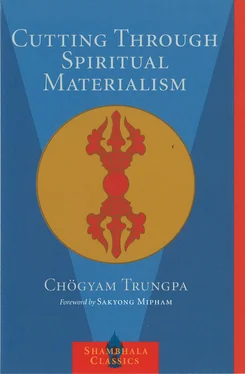—Concept, ※ ※
—Consciousness, ※ ※ ※ ※ ※
—Feeling, ※ ※ ※
—Ignorance-Form, ※ ※
—Perception-Impulse, ※ ※ ※
skillful means, ※ ※
soul, ※
space, dwelling upon, ※; fear of, ※ ※; solidification of, ※ ※ ※ ※; for communication, ※ ※ ※; in mahavipashyana meditation, ※; relative to form, ※
Speech, Lord of, ※. See also Materialism, Three Lords of
spiritual friend, necessity of, ※ ※; stages of meeting, ※; distinct from “guru”, ※. See also guru
spiritual materialism, consequences of, ※; definition of, ※; escaping, ※; seduction of, ※
spiritual path. See dharma and meditatlon
spirituality, Buddhist overview of, ※
spontaneity of awakened state, ※; of bodhisattva action, ※ ※ ※; in communication, ※; and meditation, ※ ※
stupidity, impulse of, ※ ※; realm of, ※; distinct from ignorance, ※
struggle, absence of, ※ ※ ※; futility of, ※ ※ ※ ※; ironic character of, ※; maintaining ego by, ※ ※; as origin of suffering, ※
surrender, ※; necessity of spiritual friend for, ※; pain of, ※; and Bodhisattva Path, ※ ※; to guru, ※ ※ ※; of preconceptions, ※
suffering, origin of, ※ ※; realization of, ※ ※ ※ ※; truth of, ※ ※; truth of origin of, ※ ※. See also duhkha; pain; and Truths, Four Noble
symbolism. See iconography and perception
Tantra, ※ ※; categories of energy in, ※; iconography of, ※ ※; Lower, ※; practices of, ※; principle of transmutation in, ※ ※; transition from Mahayana to, ※ ※. See also Buddhism and Vajrayana
tathagata , ※
tathagata-garbha , ※. See also Buddha-nature and intelligence, basic
tathata , ※ ※ ※. See also “as it is”
teacher. See guru and spiritual friend
techniques, spiritual, ※ ※ ※; falling away of, ※; insufficiency of, ※; strengthening ego by, ※ ※. See also : asceticism; disciplines, spiritual; gymnastics, mental
thamal-gyi-shepa , ※ ※. See also wisdom, ordinary
theism, ※ ※
thoughts, discursive: communication and, ※; meditation and, ※ ※ ※ ※ ※; as defense mechanism of ego, ※ ※ ※; origination of, ※ ※
thoughts, subconscious, ※
Tibet, Marpa and, ※; meditation of, ※; Trungpa Tulku and, ※ ※
Tibetan language, ※ ※ ※ ※ ※; lore, ※ ※ ※ ※ ※ ※; people, ※
Tilopa, ※ ※ ※ ※
transcendence, ※ ※. See also ego, transcendence of
transcendental discipline. See Paramitas, Six and shila
transcendental energy. See Paramitas, Six and virya
transcendental generosity. See dana and Paramitas, Six
transcendental knowledge. See Paramitas, Six and prajna
transcendental meditation. See dhyana and Paramitas, Six
transcendental patience. See kshanti and Paramitas, Six
transmutation, principle of, ※. See also Tantra
trishula , ※
Trungpa Tulku, ※
Truths, Four Noble, ※ ※
—First Noble Truth. See duhkha and suffering
—Second Noble Truth. See suffering, origin of
—Third Noble Truth. See goal, truth of and non-striving
—Fourth Noble Truth. See dharma and path, truth of
upaya , ※. See also skillful means
Vajra, ※. See also Buddha Families, Five
vajra, anger, ※
Vajrayana, ※ ※. See also Buddhism and Tantra
Vedantism, ※
vidya , ※. See also Skandhas, Five
Vidyadhara , ※
vipashyana meditation. See meditations
vipassana meditation. See meditations, vipashyana
virya , ※ ※. See also Paramitas, Six
“what is”. See “as it is” and tathata
wisdom, crazy, ※ ※ ※ ※. See also jnana
wisdom, ordinary, ※. See also thamal-gyi-shepa
Wisdoms, Five, ※ ※; Mirror-like, ※; of All-Accomplishing Action, ※; of All-Encompassing Space, ※; of Discriminating Awareness, ※; of Equanimity, ※ ※. See also Buddha Families, Five
“working on oneself”, excesses of, ※ ※; limits of, ※; necessity of individual, ※ ※
world. See reality
yana , ※; Three Yanas , ※
yeshe , ※. See also intelligence, primordial
yidams , ※
yoga , ※ ※ ※ ※
Yogachara school. See Buddhism
Zen, ※ ※ ※ ※ ※
1Garma C. C. Chang, The Hundred Thousand Songs of Milarepa, (New York, 1962), p. 306.
2Ibid., p. 307.
3Ibid., p. 308.











